How to get a toll-free number for your business
Toll-free numbers offer customers a direct way to contact your business. Whether it’s for phone calls or texting, here’s how to get a 1-800 toll-free number.

Toll-free numbers offer customers a direct way to contact your business. Whether it’s for phone calls or texting, here’s how to get a 1-800 toll-free number.

We’ve all used a toll-free number to reach a business — usually to reach a customer service team.
Whatever the reason, toll-free numbers are used across the U.S. as an easy way for customers to get in touch with a business.
But did you know that toll-free numbers are used for more than just phone calls? You can text-enable a toll-free number to use for two-way messaging, mass texting, and more.
Whether you want a toll-free number for texting or phone calls, here’s everything you need to know about them.
Table of contents
Toll-free numbers are phone numbers that consist of a three-digit prefix beginning with the number 8.
📱 Toll free number prefixes: 800, 833, 844, 855, 866, 877, or 888
As toll-free number calls are free for people calling in to the number, businesses often use them for customer service.
If a business has text-enabled its toll-free number, it can also send and receive text messages.
Businesses use toll-free numbers for two main reasons: free calls for customers and national brand credibility.
Free calls
When used for inbound phone calls, the biggest benefit of a toll-free number is that it’s free for customers to call.
A free number encourages customers to reach out to a business where they otherwise wouldn’t. Rather than diving through a list of contact numbers, your customers can reach out to just one number and know they’ll be directed to the right place.
Brand credibility
For businesses that operate throughout North America, toll-free numbers help show the size of your brand. For instance, if you conduct business all across the U.S. but have a number with a Phoenix area code, customers in other parts of the country may perceive your business as a local operation.
Some businesses that operate across North America choose a toll-free number for their customer support and local numbers for their physical retail locations or offices.
The Federal Communications Commission (FCC) assigns toll-free numbers on a first-come, first-serve basis. The business using the number pays for the inbound and outbound calls made from it.
There are third-party providers known as Responsible Organizations or RespOrgs, which manage and assign numbers on behalf of the FCC.
In the same way that you can claim a URL if it’s not in use, you can use a toll-free phone number that’s unclaimed through a provider or expired.
All RespOrgs have access to a database with information on the owners and status of toll-free numbers. This allows businesses that have purchased a toll-free number to move between RespOrgs and telecom providers if needed.
Only customers in the country where the toll-free number is registered can make calls to 1-800 numbers for free.
If you have customers in other countries and don’t want to pass on charges to them, you can use International Toll-free Services (ITFS) or Universal International Toll Free Number (UIFN).
Most times, you can forward incoming calls to your toll-free number to a cell phone or landline. As you evaluate toll-free number providers, check to see if they offer call forwarding. In some cases, SimpleTexting can help you set up call forwarding when you use our toll-free number texting service.
It’s easy to purchase and set up a toll-free number.
First, you must decide if you’d prefer a vanity number — one which is customizable — or if you’re happy to receive a standard toll-free number that’s randomly generated.
Vanity numbers include an 800-number prefix, followed by a word or phrase relevant to your business (like 1-800-CONTACTS). If you have the 800 at the beginning of the number, it will operate the same way as any other toll-free number.
Next, you’ll need to decide if you want a toll-free number for a landline or Voice over Internet Protocol (VoIP) service. The biggest difference is that while landline services make calls over a physical connection, VoIP enables calls through the internet.
RespOrgs offer both vanity and auto-generated toll-free numbers. Here are some providers you can use to purchase your own.
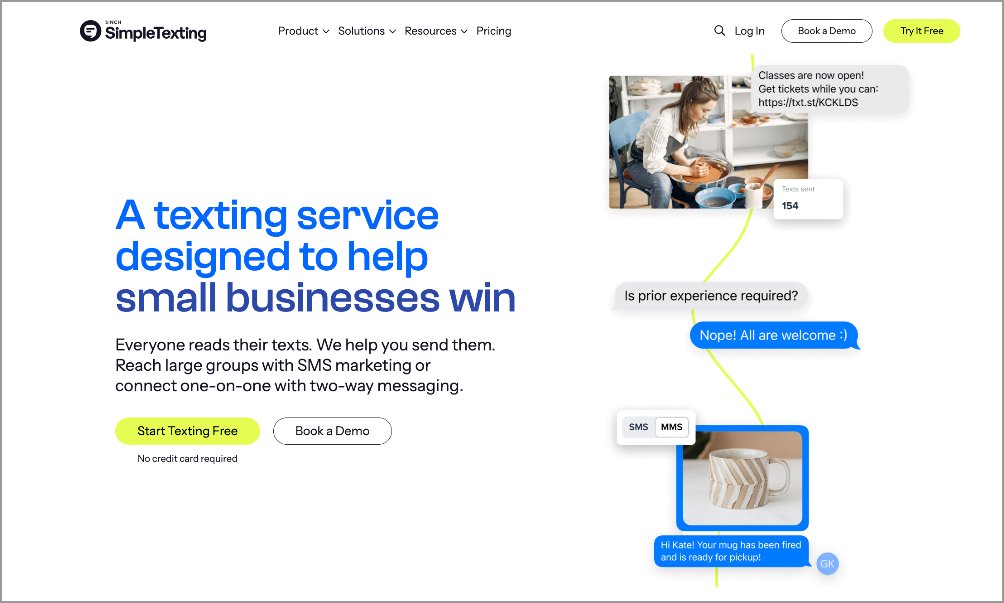
If you need a toll-free number for texting, our team at SimpleTexting can get you up and running in minutes. As soon as you upgrade to a paid account, you can start texting from your toll-free number.
Plus, we’ll guide you through the process of verifying your toll-free number with wireless carriers (an industry-wide requirement).
Pricing plans start at $29/month for 500 texting credits and unlimited contacts.
The verdict: We’re a little biased, of course, but our toll-free texting platform truly is one of the most versatile and user-friendly platforms out there. See what other business owners and marketers are saying about us on third-party review sites.
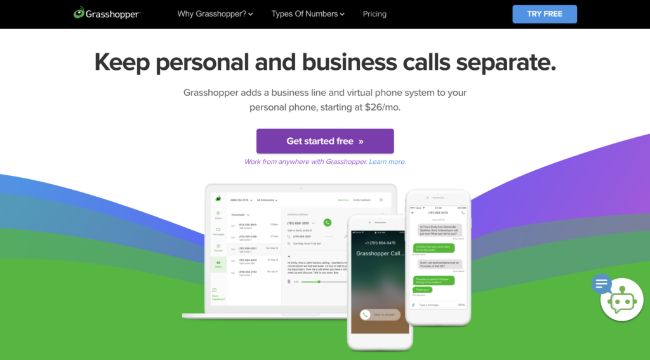
Grasshopper continuously updates its toll-free numbers; it offers a variety of 800+ numbers, including vanity number options.
Prices start at $16 per month and the service includes unlimited minutes with any plan.
However, Grasshopper has limited features, which means businesses may quickly outgrow it. Without call recording, call routing or the option of an automated voice menu, businesses need to be available to pick up the phone. The bigger the business, the harder this will be to navigate around.
Verdict: If you’re looking to move away from using your personal phone number for business, Grasshopper is a great option. Businesses with 1–5 employees may get the most out of Grasshopper, since it has limited features compared to other providers.
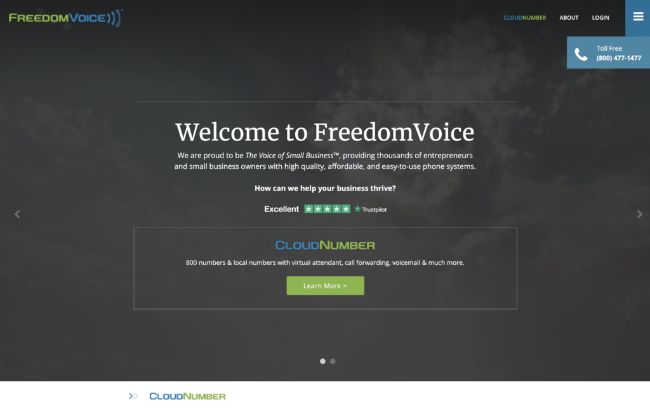
FreedomVoice has been a toll-free number provider for over two decades. It’s one of the most reputable in the business, and offers affordable, minute-based plans starting at 400 minutes.
FreedomVoice offers a toll-free number setup in just minutes. It offers fewer features than competitors, and wouldn’t be the right provider for a large business. However, it is ideal for smaller businesses that aren’t looking for a VoIP system, but may look to scale in the future.
Verdict: FreedomVoice doesn’t have the bells and whistles, but that isn’t necessarily a bad thing. The installation process is quick and simple, and the variety of numbers available make it a great option for small businesses that are looking to add credibility with a toll-free or vanity number.
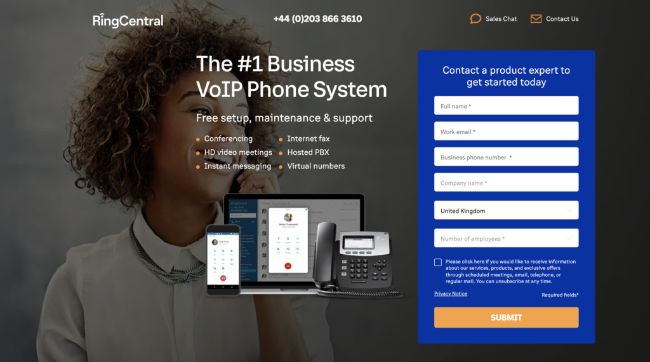
If you’re looking for a provider that has it all, RingCentral is your one-stop-shop for all things toll-free. With plans ranging from 10,000 to 100,000 minutes, it can accommodate businesses of all sizes.
On top of the toll-free numbers on offer, RingCentral also provides a range of other services and features including faxing, conference calls, and call logs. Its range of tools enables established businesses to merge any existing communication strategies with their new toll-free numbers.
Verdict: Thanks to its range of plans, businesses of all sizes can utilize RingCentral. From purchasing a basic plan to one with all of the add-ons, you can build a bespoke plan with your toll-free number, dependent on your business’ needs.
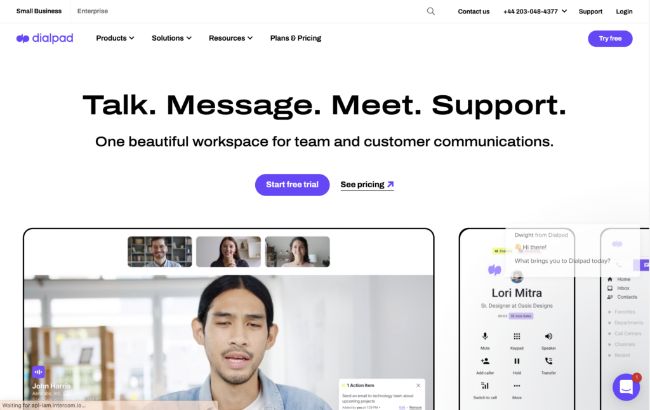
While a relatively young company, Dialpad stands out from its competitors because of its range of integration and collaborative features.
Not only can you purchase a toll-free number from Dialpad at $23 per month, but you can optimize your workflow to create a seamless integration between any apps or tools you may already use.
Dialpad offers monthly breakdowns of your call metrics, including who placed the call, the date/time of each one and the cost of the call.
Verdict: Dialpad should be your go-to if you are a company with an established workflow across a variety of different apps. From Slack to G-Suite to Salesforce, you can integrate Dialpad to optimize a range of processes within your business.
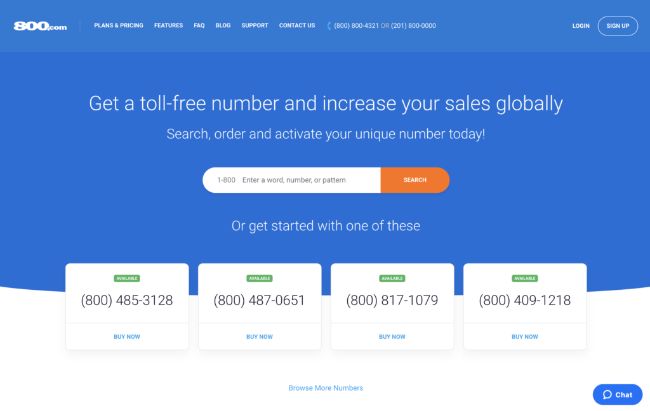
800.com is a user-friendly, fast toll-free number service provider for companies of all sizes.
Users have the option to choose a plan with unlimited minutes or a plan that offers unlimited seats, but with limited minutes. As 800.com enables number parking, you only need to pay for the service as and when you use it.
Verdict: 800.com is one of the easiest ways to get a toll-free number up and running without compromising on features. Other features include faxing and call forwarding. For the high price tag, though, most businesses would expect call recording to be an option—which it isn’t.
The expenses associated with toll-free numbers can differ, but they fall into a few major categories:
Once you’ve chosen your toll-free number, you’ll need to have it verified. Wireless carriers require toll-free verification to help cut down on spam texts.
Verification may sound intimidating, but our team is here to help. You’ll just need to provide some basic information about your business and what kinds of texts you’ll be sending.
Note: Once you choose your toll-free number, you won’t be able to send messages until you’re fully verified (that’s typically 3-5 business days).
Toll-free numbers make communication easier for both parties. Whether it’s enabling customers to call up for free, or allowing businesses to better manage their inboxes, it’s never been easier to build strong customer relationships without being face-to-face.
Toll-free numbers offer a degree of separation between the personal and professional. If you’re a business looking to step away from using personal cell phones, why not text-enable your toll-free number with SimpleTexting? Join now for a risk-free, 14-day free trial.
Alice is a copywriter at SimpleTexting. When not teaching the world about the benefits of business texting, you can find her feeding family, friends and strangers with her latest baking experiment.
More Posts from Alice DoddLearn about six principles to every good PR campaign and the tips and tricks within each step. From objectives all the way to evaluation.
ReadCall routing is a call management feature used to place incoming calls in a queue. Learn about call routing and how it can optimize customer contact.
ReadStart a text marketing campaign or have a 1-on-1 conversation today. It's risk free. Sign up for a free 14-day trial today to see SimpleTexting in action.
No credit card required